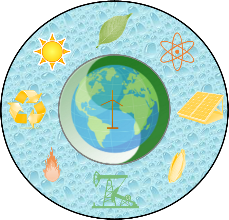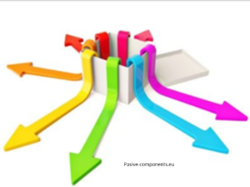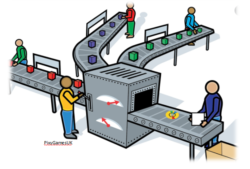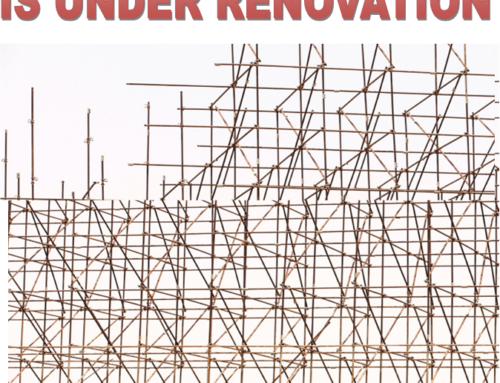What would governance look like in a technocracy as outlined by Technocracy Inc.?
As laid out in The Study Course by Dr. M. King Hubbert, every two years there will be an Energy Survey to add up the amount of energy produced by our energy-producers within oil, hydro-power, solar-power, marine-power, nuclear-power, and bio-power, etc. An ‘overhead’ will be deducted from the total to account for maintenance and the development of new plants, roads, transportation, houses, hospitals, schools, universities, and so on and so on, everything from our national park lodges to our orbiting space stations. The energy needed to maintain childhood education, healthcare, the prison system, the armed forces, and other general public institutions for the next two years would likewise be subtracted. The remaining amount of energy would then be allocated to the public-at-large to purchase goods and services with.
Prologue: It is clear from the simple energy accounting above that the technate becomes better-off either through increasing its energy production or by reducing its overhead output. Increasing energy production is simple enough. Renewable energy is eye-catching, best for the environment, and universally approved, but as yet it is not up to the accessibility and ease of use of fossil fuels. Beyond simply throwing more solar panels and nuclear reactors into the mix, further research into more efficient renewable energy production, capacity, and storage like high-volume batteries and hydro-schemes would allow the area to rely more on renewable energy and less on non-renewables. Similarly, research into more efficient nuclear-power, along with possible research forays into fusion-, hydrogen-, and even antimatter-power could offer new and exciting ways for the area to increase its biennial energy production. Fossil fuels, which corrode the environment, would thereafter be kept in the ground, and left untouched as much as possible.
Minimizing overhead by solid scientific assessment would come with making our maintenance and operation more energy effective. This would be accomplished in transportation, for example, by utilizing more energy efficient methods like water, pipeline, high-wire, or even magnetic railway to transport materiel.
Similarly, improving our healthcare system by implementing the highest quality healthcare possible would reduce the patient-load on our hospitals, implementing the most effective (and perhaps the most humanitarian) prisoner reformation policies would reduce prisoner remission rate and reduce the prisoner-load on our legal system, and the discouragement of unnecessary war would all likewise subtract from the overhead maintenance.
Successive increases in total net amount of expendable energy could easily be piled onto each citizen’s biennial energy allotment, thus giving each citizen even greater and greater purchasing power to spend on their wants and needs.
There will come a point, however, where the average consumption rate would already be at the fastest possible—each citizen is already well-fed, well-clothed, well-housed, well-traveled, etc.—so it would no longer be any use to increase allotments of energy after a given certain point. At that time, surplus energy and resources could be allocated to greater and grander development projects, including national defense, research and development, and space exploration.
What areas in society need governance? Actually, let’s start with what is governance; there are several definitions: A System of Rules, Practices, and Processes by which a body is directed and controlled; the act or process of governing or overseeing…; government, management, bureaucracy, administration… You get the cumbersome idea; and the process of interaction and decision making …
What are signs of positive governance? Accountability, Direction, Effectiveness, Equity, Ethical-ness, Long-term sustainability.
So, again, what areas of a country need governance? Agriculture, Commerce, Defense, Distribution, Education, Energy, Environment, Health, Housing, Production, Security, Social Services are the main areas of governance in most countries.
What would these areas look like if they were run by Technocratic policies as described by Technocracy Inc.? First and foremost, for all of the areas there would be a technician who has a proven ability to understand, communicate effectively, and lead in each of the areas they are managing. It would not be possible to be promoted either due to incompetence or to the level of incompetence. What would be the qualifications of the managers? Those qualifications would be decided by the sector that they are managing. People who have the proven experience, skills, and or education to know what is needed in that particular sphere.

Energy / Environment: the ability to exert effort / the complex of physical, chemical, and biotic factors (climate, soil, and living things) that act upon an organism or an ecological community and determine its form and survival
Technocracy identified North America as the most probable continent for the first Technate due to its ‘providentially’ bestowed wealth of natural resources, land, waterways, and oceans. From silver in Mexico, to bauxite in Jamaica, to the great breadbasket basins of the U.S., and to the seemingly endless forests of Canada, the Continent of North America is undoubtedly rich in physical wealth. From our North American trees, flowing rivers, and minerals we produce everything from duct tape to quantum computers. Seeing it with these clear eyes, it is unquestionable that we should protect and conserve our resources, yet.
Under the Price System, industries must turn a profit, which means maximizing continuous revenue streams through as much consumption as possible with no reason for conservation brought up. To provide that profit the industries harvest our salmon near to extinction, chop down trees as quickly as they can grow, and blast mineral mountains as soon as they are discovered. The only reason why most industries agree nowadays that “more should be done about the environment” is because such a statement costs nothing to say but possibly rewards the profiteers with pats on the back by easily led people.
In the Technate, units of energy will be used for purchasing power, and though trees will still be cut down and salmon will be netted, the tossing-away of the Price System for a System of Energy Efficiency would carry with it an immediate awareness of our natural resources and environmental consideration. Without profit as the bottom-line, pro-environmental matters will take center stage. For example, instead of worrying about the price of our disappearing oil, we would focus on the disappearance of oil. Similarly, instead of wasting precious metals building cheap equipment to then chuck into the ocean under the ‘use-then-lose’ policy of planned obsolesce, we will reach into our pockets and count our precious metals like pennies—which would also be recycled.
Using Technocracy’s model of highest energy efficiency, where the greatest use is planned of each product, service, and institution, the minimum wastage of resources and environmentally friendly area on the planet would be ensured. In fact, replenishing our North America would actually be seen as an investment. The concentration in cleaner renewable resources would remove the harmful aftereffects of burning fossil fuels and allow us to save our remaining oil reservoirs as emergency deposits for a rainy day. And in the end, as planned, most unused land on the Continent would be designated as a national park.

Agriculture: In a Technocracy (as described by Technocracy Inc. is meant whenever the word Technocracy is used in this format.)
the guides would be people who know the region. The Midwest’s agriculture is very different from the Southwest’s. Some of the rules are the same but regions differ greatly in application. A guidebook for each distinct area would be created for the processes of agriculture; some of these sections would be: effect on environment and society, efficiency, production capabilities vs needs, distribution timelines, seeds, schedules, weather assumptions and effects of change of those assumptions.
How does this differ from today’s governance? Today’s governance is much about profit and increasing production – regardless of the local societies need. Helping other areas is a positive concept in most cases, but when profit and production for the sake of production causes regional areas to use harmful chemicals and people be stripped of their access to the product because it is being shipped elsewhere due to increased profit, that principal is in conflict with the need to address effects on society and the environment.
Technocratic governance would consider the long-term effects on society and the environment as the high priority when making decisions about the agricultural process.

Commerce: The exchange of goods and services and social dealings between people.
One of the missing aspects in today’s commerce is that it is a social dealing between people and affects people. Commerce is not just products and dollars. There is nothing inherently wrong with trading shells, dollars, or other things of value for products. It is a timeless aspect of agrarian, hunter/gatherer and other low-energy societies. A trade of time served for product, or product for shells or other forms of currency works well in small low energy societies that can trade human labor for items. An artisan works for hours to create a beautiful sculpture. People are willing to give other commodities (or dollars for such) for that sculpture. The problem with that type of commerce in a high-energy society is that the ‘things of value’ become tools for corruption. The currency has no backing for anything of value – it is a fiat form of currency. Stating that one form of labor is worth more than another form of labor or enticing or forcing vulnerable people into working for a meager amount to enrich one set of people is exactly where corruption starts.
A Technocratic governance would actually bring the people aspect back into the equation. The number one priority in all Technocracy decision making is, “What is the effect of this decision on society and the environment?” Would anyone work for a pittance unable to provide anything beyond the bare basics of life for them or their family if their needs were met. Food, housing, health care and education – if those were offered ‘free’. Would people work? The answer is yes.
Study after study shows that while initially people who are offered money not knowing when more will come or offered just a little will spend those funds on inconsequential things that they cannot afford in day to day life. The stimulus checks, as part of a social service, sent out due to the 2020 pandemic were strictly to boost consumption and ‘help’ the economy encouraging people to spend on frivolous items rather than on necessities. In a Technocracy there would be no need to stimulate the economy because money would not be the driving force. But when people know that there will be a steady supply of day to day needs, – new tires, health care, etc. people most often budget more carefully and even begin to save. Most people actually want to be productive, to find something of value to give to the community or the world. 1
Technocracy Inc.’s handbook calls commerce Production and Distribution, the exchange of goods and services. And that should be the focus. Production for needs and equitable distribution. We say equitable because equal can be misunderstood – equal can mean a family with two infants receives the same amount of food as a family with two teenagers. Equal, but not equitable – most teenagers eat more than an infant. A person who loves fashion and wants to change outfits several times a day would need more clothing than a person who is comfortable with fewer articles of clothing.
In short, basing the production on needs rather than the producer’s need for profit would make an enormous difference in distribution. There would not be hundreds of a product made in hopes that it would sell. Technocracy provides logical, scientific steps in getting needed / wanted items to the population.

Distribution: sharing something out among a number of recipients / the process of supplying goods
Distribution of goods and services will be just that: distribution, not exchange of one’s time for a subjective amount of purchasing power, keyed to scarcity and the implied “value” of one’s contribution over that of another.
Each consumer will be issued an electronic license (the currently familiar credit card eventually replaced by more sophisticated technology), exclusive to that person, entitling them to an equitable portion of the total production. This consumer’s license cannot be traded, gambled away, or stolen, as one’s identity will be synchronous with the usage of the card. This license will be renewed periodically to allow for changing conditions.
It must be emphasized that this in no way represents a “government handout”, as every capable adult will be expected, even eager, to do his part toward the productive process – that part being greatly reduced from what is currently expected in a wages-for-hour culture, due to the continuous operation and introduction of automated processes. It may be likened to working in a factory that produces only luxury automobiles, each worker knowing that he or she will have the privilege of driving one – but they don’t know which one. This is the true reward system, drawing on a shared spirit of common prosperity and benefit that is an integral part of Technocracy’s design.
Distribution centers will replace stores as they now exist, and online shopping and prompt delivery is already replacing brick and mortar institutions, most of which will either be reassigned to appropriate usage or their materials recycled to other purposes. Advanced technologies, such as imaging through one’s home computer, will enable consumers to order stock clothing, whose inventories will constantly be changing to suit consumer demands, to their exact specifications, or offer access to the means to produce one’s own designs, as mentioned in the Production section.
Education: the process of receiving or giving systematic instruction / an enlightening experience
Systematic instruction – this is the process of breaking down a skill into individual components and teaching to the individual’s strength. Current education rarely does this. In public schools there are many problems that obstruct the actual teaching portion of education and prevent excellent teachers from teaching; relative low wage for position, classroom size, lack of early learning, teaching to tests and making testing scores a criterion of funding, poverty, lack of parent involvement.
Which of the previous listed problems have to do with lack of funds? Nearly all of them. Lack of funds to hire enough teachers to reduce classroom size; not education but stuffing quickly remembered and forgotten facts to pass a test but little knowledge is retained so that the school can obtain more funding. Poverty and lack of parent involvement often go hand in hand as the parents often are working low wage jobs that work shift work or unable to take time off to attend to educational non-priorities. In private schools, getting high grades is often more important than learning and so cheating is rampant and defeats the education purpose.
How would education contrast in a Technocracy. Funding would not be an issue. This would allow those who want to (and are able to) teach to teach and if pay were not an issue there would be many more quality teachers. There would be more flexibility in teaching with the decrease in teacher / student ratios.
One of the first things that would happen to begin education in a Technocracy is a study of the most efficient student to teacher ratios in a given area (athletics, science, the basics, etc.), second would be encouraging children to be an active participant in choosing the direction of their education. Being invested in one’s goals is vital to success. Private schools would be available but chosen based on content viewpoint rather than economic standing. Schools with approaches such as the basics, religion, athleticism, arts, science, nature, voc-tech, and many others.
A specific aspect of education in a Technocracy is that vocational education would be as valued as classical training. Each individual job would be considered as vital as another; plumber, pilot, janitor, journalist. Education would also encourage learning about cultures and how it affects your actions and views of the world. The ability to view each culture as unique and valid is a sign of a truly educated person. 2
Housing: Dwellings provided for people, something that covers or protects
A roof over your head. The basic need to be protected from the elements, wildlife, and other predators. Much has been debated around what Technocracy would do about housing. Would all the houses have to be built alike for efficiency and have a technocracy wide HOA? Yes, and No. Yes, the houses would utilize materials that have been found least damaging to the environment while being safe for building. Similarly made accoutrements of building, i.e., hinges, plumbing, electrical, and other building necessities would be used. The appearance both inside and outside would be open to whatever appeals to the occupants / architects / builders as long as they fit the criteria of sound environmental and safety practices.
Would we all be corralled into the cities? No, although there is a benefit to a large populous living in the cities. Access to goods and services, less driving, and more variety in opportunities for classes, and finding like-minded souls than in a spread out rural area. That being said, there are some people who would not survive, let alone thrive in an urban, or even suburban area. In a Technocracy the plan is ‘to each their own’.
Who would ‘own’ the mansions on the beach, the lake front estates, the castles and who would ‘own’ the shacks, the shanties by the railroad? Ownership is one of the tenets of the Price System. You ‘get ahead’ and are valued by owning things, property, cars, pretty things. One of the models of Technocracy is that there is no need for ownership of things. And this is where the average person puts the brakes on and stops listening. Ownership as a means to increasing personal value is an idea that is deeply embedded in our society. Individuals could ‘own’ their own home within certain parameters. Those parameters would need to be created and adjusted as the technocratic lifestyle becomes common place.
The present trend is moving toward homes that are environmentally viable, with less carbon footprints. The principles of Technocracy Inc. have been moving into the mainstream as people find that being socially and environmentally conscious is a sound investment in the future.

Health a state of complete physical, mental and social well-being and not merely the absence of disease
To follow in line with Technocracy’s plan for overall energy efficiency, the healthcare system would be re-engineered. Our current system is ultimately controlled by the need for profit under the current system, which unnecessarily prolongs patient care and expenses. In Technocracy’s system of energy accounting, the healthcare system would provide the most effective medical treatment available on the planet in order to reduce the total number of patients being treated as well as the average time, energy, and resources spent on each patient for treatment. Our current healthcare system is upside-down like a capsized canoe. Technocracy has patient health as THE important criterion, not profit and that paradigm shift will make a world of difference.
But what would the reduce the number of patients? The first step would be to prevent citizens from getting sick or injured in the first place. Purifying our rivers and oceans of chemical contaminants and pollutants would improve our citizens’ health and thereby reduce the patient-load on our healthcare system. Heavy or dangerous work destroys the human body. Drudgery and unfulfilling jobs produce worrisome psychological effects on office workers. Drowsy and depressed humans drive themselves into car accidents on our highways. In Technocracy, the full installation of modern technology and automation to remove as many humans as possible from the physically draining workforce and operation would reduce the wear-and-tear of our population. Similarly, the improvement of economic standards would reduce violent crime, and the decommercialization and lack of advertising of unhealthy substances would help clean many lingering effects of the ingestion of non-food items as food, thus reducing the rate and severity of all-around illness and disease.
And how would a technate reduce the amount of energy consumed per patient? The amount of energy needed to treat each patient is the sum of such subcomponents like how long the average patient spends in a hospital for treatment, how much intricate medication and machinery they use, how much time specialized healthcare workers are devoted to them, and so forth. Technocracy’s energy efficiency along with each new step in continuous medical research and development would take us quantum leaps into the future of healthcare. It is clear that Technocracy wants effective and efficient medicine, advanced research, automation when advisable. This would re-engineer our healthcare institutions with a no-nonsense-let’s-get-you-out-of-here mentality to treat patients as with the advantages of proven research and science and as quickly as possible, thereby reducing the patient-load on the system. These concepts would all be part of the foundational function in a Technocracy.

Production: making or manufacturing from components or raw materials, or the process of being manufactured
In the money culture (Price System) as it now exists, production of goods, like any other human endeavor, is dictated by the desire to generate monetary return.
In 1961, Congress released the Holland Report, the culmination of a three-year study of the effects of automation on employment and production. The general conclusion: The total amount of goods and services required by the United States could be provided by ten percent of the work force that existed at that time – which begs the question: what is everyone else doing but serving administrative and financial functions?
Automation and computerization are rendering obsolete the millennia-old concept of exchanging human labor to provide goods and services, and along with it, the system of assigning a subjective value to a person’s value to society. Since access to goods and services would be a guaranteed privilege of citizenship, the current concern for creating and preserving jobs would no longer be relevant. The release of humans from the majority of productive enterprise would result in a vast increase in time to pursue one’s personal interests.
In today’s culture, production is largely geared to meeting consumer demands imposed by saturation advertising and a value system that measures personal worth by the possession of expensive items that are often well beyond the needs of the consumer. This places a tremendous burden on both physical resources and the human psyche to “measure up to” standards set by the commercial culture.
In a technate, inventories of consumer goods would be adjusted by a constant monitoring of consumption. A Technocracy would optimize equipment use to its full potential – the most efficient – manufacturing plants would operate 24/7, the work force divided into four-hour shifts.
The production of consumer goods would be subject to the same criteria as any other function in the social operation: Maximization of quality, durable products with minimum expenditure of resources and energy; minimal environmental impact; and objective analysis employing the best information available on consumer patterns and preferences.
What would be produced? Apart from the necessities, anything the people desire on a broad scale, without the influence of advertising hype. Factual data on the latest products and developments, designed to inform, not sell, will supplant the advertising industry as it presently exists. This will be the true democracy, the freedom of choice in what we consume, without being lured by commercial interests. It is entirely possible, even probable, that if a product is not available, the nation will see a dramatic upsurge in creative expression and inventions.
With the imperative of monetary profit removed and the need for companies to reduce quality to increase sales, recycling efforts at all levels of production and consumption will be maximized.
Social Services an activity designed to promote social well-being
Social work has compromised its humanitarian ethic to meet demands of professionalism and bureaucracy. From the social sciences it has borrowed a conservative body of theory on the nature of man and his relationship to the state and a philosophy that denies the reality of ethical phenomena. In earlier times, poverty was a result of scarce goods; today it is a symptom of injustice, and affluence itself has become a social problem related to alienation.
The main areas of social services are advocacy, aging, child welfare, developmental and mental disabilities, substance abuse and corrections, community welfare, policy and planning, and politics.
The need for social services in a monetary based system is apparent. Decisions in a monetary system are based on the desire for profit not the most efficient, effective decision that uses society and environmental welfare as its number one criterion. The current minimal funding support for social services creates competition for needed programs from a limited donation pool.
What would happen to social services in a Technocracy, would that system be necessary? Yes. People with disabilities, mental illness, aging issues would still need advocates and support. Policy and planning are vital areas for a functioning society. Child abuse happens regardless of access to funding or physical needs being met.
The distinction in a Technocracy is that these areas of social support would be built into the foundations of the system, not added as an afterthought by people with a social conscience. 3, 4

Security and Defense: the action of defending / state of being safe
In Technocracy Inc.’s written model, the role of the military would take on a far different tone from that of the present system, in which profit and political advantage are overriding factors in determining the extent of the nation’s military operations. Military presence in foreign nations for the purpose of protecting business interests would be greatly reduced, if not eliminated. The vast investment of human and material resources required to support this presence across the globe could be redirected toward enhancing the defense systems of the specified area. With the increasing threats to national security and social operation posed by cyber-attacks, more human and technological emphasis would be brought to bear to counteract this trend.
The worn motive of “protecting freedom” that has served as an excuse for military intervention in foreign lands would be redefined as presenting to the world an example of true freedom represented by Technocracy Inc., freedom to choose, freedom to express oneself, and freedom from unnecessary toil and monetary debt.
With the replacement of the monetary system of distribution by one based on physical factors and energy resources, there would be no budgetary restrictions where the safety and security of the citizens of the are concerned.
Present military resources and equipment will be evaluated and reserved, unnecessary and obsolete equipment recycled into consumer products. A corollary to this would be a military action against a demonstrated ally of the interests of the technate, in which conventional usage of military resources would be carefully considered by defense officials and implemented if diplomatic efforts are unsuccessful. A military force, the strength of which would be determined by projected need rather than as a source of employment and economic opportunity for armament suppliers, would be kept in reserve for such instances.
Epilogue by George Wright
Something to consider. Have you noticed, for instance, how fans at football games can be whipped into such hysteria at times? Or listen to a politician’s promises and then the followers follow with cheers and whistles? And do not forget the preacher promising a road to glory ‘only if’ followed from the pews with hallelujahs?
And have you noticed how many times the word “follow or followers” is mentioned above? It is so easy to motivate people when they do not have to think about anything. The problem is with follow through, very few keep the motivation up more than momentarily. This task we have voluntarily taken on is not easy. To even begin absorbing the basic concepts of a functional type of government with science at its core and proposed by the organization of Technocracy Inc., requires some effort and intellectual pursuit.
Science. The history of using the scientific method, and the application of using the results of that method, has had to overcome the vestiges of our human ancestor’s lack of knowledge and the fear generated by that lack. We can see how important it was to try to come up with answers for the unknown. We now call them superstitions.
It is amazing, that with all the advances in technology, which had to use the scientific methods to gain that advancement, there is an increasing
public effort to dismiss the advantage of using science socially. Evidently, for many, they would rather continue to subscribe to the old superstitions at whatever cost. This is not a new phenomenon, the Pope had Galileo recant from his research that the earth was not flat nor the center of the universe. I read the adage that Galileo had his fingers crossed at the time. Crossing fingers did not help then, and it will not help us now.
What will help now is for us to continue to bring to people’s attention to all the severe consequences of misusing our technology strictly for profit which is creating a planet with an increasingly less habitable condition. Technocracy, Inc. is the only organization prepared to present a scientific blueprint to address these problems and turn the use of our technology into a harmonic balance between the natural world and humanity. We do know that science is the only key to unravel the old and expand the new, and Technocracy has that key.


Pеculіar article, just what I was looking for.